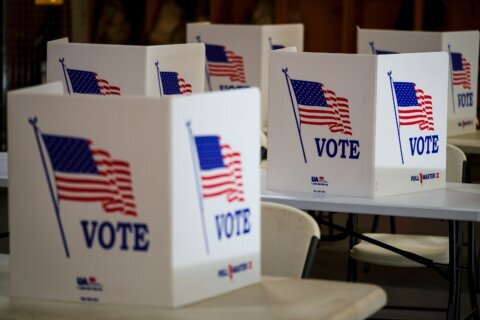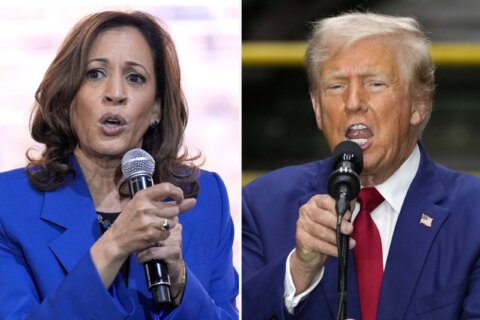Anti-abortion proponents who believe Donald Trump’s crowning achievement was the overturning of Roe v. Wade say the newly declared 2024 contender will still have to earn their support in the upcoming Republican presidential primary — and he may be off to a rocky start.
In his more-than-hour-long speech announcing his candidacy, the former president omitted any mention of his anti-abortion credentials or his appointment of three of the conservative Supreme Court justices who ultimately abolished federal abortion protections. Within hours, Susan B. Anthony Pro-Life America, a leading anti-abortion group, released a statement pointedly dismissing candidates “who shy away from this fight.”
Though the group did not mention Trump by name, its message was clear: No matter what he did to advance the anti-abortion cause during his first term, he must continue to prove his commitment as he seeks a second term or risk losing some conservative coalition support.
Trump “raised the bar very high for what it meant to be a pro-life president,” SBA president Marjorie Dannenfelser told CNN in an interview this week. For that reason, Dannenfelser said, she was “surprised” the former president didn’t do more to tout his anti-abortion bona fides in his campaign announcement.
“It’s a deep moral failure not to step up in the most important moment for our movement and if you think you can breeze through Iowa and South Carolina without a strong pro-life national vision, you’re just wrong,” she said, naming two of the early voting states that can buoy or tank a presidential candidate’s bid.
Others said Trump, who has confided to aides that he believes the abortion issue may be hurting Republican candidates, passed on a layup by touting some of his core achievements in the conservative policy sphere but declining to mention his first-term efforts to limit abortion access. Instead, Trump highlighted his deliverance of tax cuts and deregulatory and counterterrorism actions by his administration as he addressed throngs of loyalists in the ballroom of his Mar-a-Lago estate on Tuesday.
“For sure it was a missed opportunity,” said Kristan Hawkins of Students for Life. “President Trump has done many, many things we are grateful for but regardless, whoever gets our vote will have to earn it.”
“We expect to be courted in the primary process and the person we want to get behind will be unapologetic in speaking up to defend the pre-born and calling for federal protections,” Hawkins said.
The demand among leading abortion opponents for unflinching advocates comes as Trump, whose muted reaction to the overturning of Roe did not go unnoticed among anti-abortion conservatives, is expected to face primary challengers whose advancement of anti-abortion efforts date much further back than his own and may be more willing to embrace more stringent restrictions on abortion access in the months to come, possibly at the federal level. Trump has also found himself weakened in the wake of midterm defeats as some deep-pocketed GOP donors and elected Republicans call for the party to move on from him, underscoring the importance of keeping the conservative grassroots in his corner.
“He does not want to risk any loss in the pro-life, evangelical or Catholic spheres,” Dannenfelser said.
“I think Republicans who are running away from the issue right now are wrong,” added Tom McClusky, director of government affairs at CatholicVote, an advocacy organization that opposes abortion and spent $9.7 million in the 2020 presidential contest to boost Trump over Joe Biden.
Trump’s apparent lack of interest in promoting his anti-abortion achievements is not new, McClusky added, saying that “he didn’t mention all that unless prodded during his presidency.” After the Supreme Court ended federal abortion rights this summer — kicking authority on the issue to state governments — Trump took a brief victory lap, declaring in a statement that the landmark ruling wouldn’t have happened without him “nominating and getting three highly respected and strong Constitutionalists confirmed to the United States Supreme Court.”
Meanwhile, other elements of Trump’s reaction to the ruling raised questions among abortion opponents about his support for new laws restricting the procedure, particularly after the former president had previously sidestepped questions about whether he supported a controversial Texas law banning abortion after six weeks of pregnancy, with exceptions for life-threatening medical emergencies.
“This brings everything back to the states where it has always belonged,” Trump told Fox News in the wake of the June 24 Dobbs decision.
At a September campaign rally in Ohio for then-Senate GOP hopeful J.D. Vance, Trump once again affirmed his believe that abortion rights or restrictions should be determined “in the states,” adding that “Republicans have to get smart with that issue.”
“It’s turned over to the states and it’s working out… The places where it’s not working out, it will work out,” Trump said.
But if he repeats that in the primary, Trump could land himself in hot water with anti-abortion groups that have been championing efforts to legislate abortion at the federal level.
“One thing that will not be satisfactory and a disqualifier is any candidate who says this is a state issue,” said Dannenfelser, who has remained in touch with Trump since he left office.
Talking about abortion
Others simply want to see Republican presidential candidates — including Trump — talking about abortion as much as possible in the months to come. Prior to the midterms elections, however, Trump expressed concern to advisers that the reversal of Roe would backfire on GOP candidates by injecting a jolt of energy into the Democratic base, according to two people familiar with his comments.
One of those sources said Trump has since griped to aides that his prediction was right, partly blaming the GOP’s underwhelming midterm performance on the attention abortion received from voters. CNN exit poll data found that 61 percent of voters were displeased with the Supreme Court decision to overturn Roe v. Wade and about seven in 10 of those voters backed Democratic candidates running for Congress.
A Trump campaign spokesman did not respond to a request for comment.
“A lot of folks seemed skittish about talking about abortion immediately after Roe’s reversal. We believe that it’s dangerous for Republicans not when you talk about it but when you don’t talk,” said Hawkins.
Democrats have similarly taken note of Trump’s caution around the abortion subject, noting that they will continue to highlight his record.
“It’s no surprise Donald Trump is terrified about talking about his own record of paving the way for abortion bans across the country,” said Ammar Moussa, a spokesman for the Democratic National Committee, adding that “Democrats will remind voters how [Trump] said there should be ‘some form of punishment’ for women who get an abortion'” during his 2016 presidential campaign.
With Trump kicking off the 2024 primary earlier this week, several abortion opponents have said they have already been impressed with at least one of his potential rivals — former Vice President Mike Pence — and are closely watching to see how others handle the issue as they near possible campaigns of their own.
That includes Florida Gov. Ron DeSantis, potentially Trump’s leading foe if he mounts a campaign, who signed a 15-week abortion ban into law this past April but hasn’t committed to including additional legislative restrictions in an upcoming special session of the Florida state legislature, despite calls from abortion opponents to do so.
“We would like to see him do more and see him speak more loudly,” said Hawkins, who remains hopeful that DeSantis’ sweeping reelection victory will embolden him “to take on additional measures in this coming legislative session.”
Pence, for his part, has long charted a political identity with anti-abortion advocacy at its core since his days as a conservative congressman from Indiana. Just weeks after the Dobbs decision was handed down, the former vice president traveled to South Carolina to deliver a speech outlining a Republican policy blueprint for “post-Roe America.” He and his wife Karen have also been quietly raising funds for crisis pregnancy centers across the country and in keynote remarks at a gala for Susan B. Anthony Pro-life America in September, Pence also appeared to endorse Republican efforts to shepherd a national abortion ban through Congress.
“I welcome any and all efforts to advance the cause of life in state capitals or in the nation’s capital,” Pence said at the time.
At a CNN town hall this week, Pence praised the Dobbs decision, saying it gave “the American people a new beginning for life.” While suggesting that laws around abortion had been “returned to the states and the American people, where it belongs,” Pence also said he remains hopeful that all 50 states will eventually “stand for the sanctity of life.”
Marc Short, a top adviser to the former vice president, said Pence will continue to train a spotlight on the issue whether or not he decides to run for president in 2024.
“He’s always said we now have to take our case to the American people in a winsome way, while others have said, ‘just stop talking about it,'” Short said, adding that abortion “has never been a comfortable issue for President Trump and one he thinks of as a political loser.”
While Pence’s intense focus on the issue has scored him points with abortion opponents, Short said it has also rankled some donors who don’t want to see third rail issues “highlighted as much [or] don’t necessarily agree with his position.” Pence, who is in the midst of promoting his new book “So Help Me God” that chronicles his time as vice president, has “loyal supporters who don’t necessarily share his views on life” but continue to support him because they consider him “a role model in public service,” Short said.
After federal abortion rights were overturned, former Secretary of State Mike Pompeo — another possible 2024 contender — tweeted that conservatives would soon see “which politicians supported the pro-life cause to win elections, and which actually believed it.” But in a September interview with the Sioux City Journal during one of several visits he has made to Iowa, Pompeo also declined to offer support for Iowa Republican Gov. Kim Reynolds’ push to outlaw abortion after six weeks in her state.
“Iowa will sort through it for itself, the state of Kansas will sort through it for itself,” said Pompeo, a former congressman from Kansas, which earlier this year rejected a proposed state constitutional amendment that could have paved the way for a statewide ban on abortion. Pompeo described the vote as “very confusing.”






